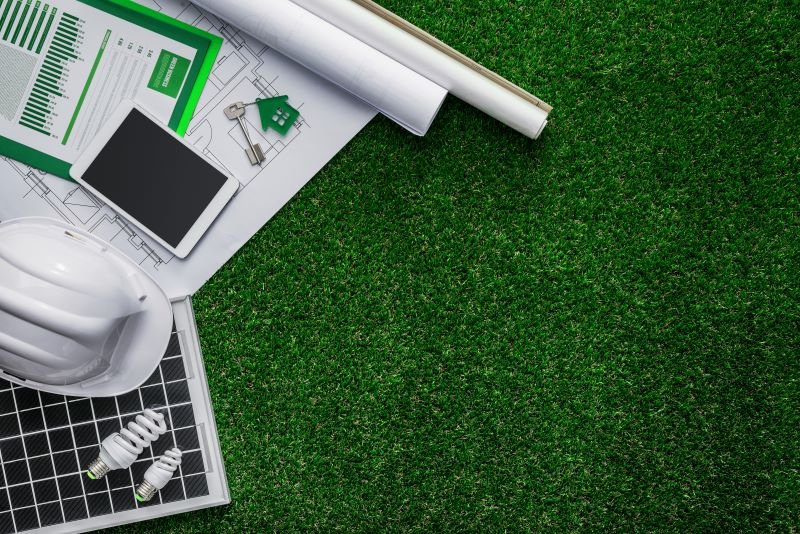Building a Sustainable Future: Incorporating Energy Efficiency into Custom Homes
In a world of rising environmental consciousness, eco-friendly construction and energy-efficient custom homes have gained significant traction. Building a sustainable future benefits homeowners, the environment, and society. This article explores the advantages of eco-friendly construction and provides practical insights on integrating energy-efficient features into your custom home. Let's explore a greener, more sustainable way of living.
Benefits of Eco-Friendly Construction
Eco-friendly construction offers numerous tangible advantages. Using sustainable materials and green building practices helps reduce environmental impact. Opting for recycled or responsibly sourced materials conserves resources and promotes ethical manufacturing.
Energy Efficiency: Efficient energy usage is vital to lowering utility bills and reducing your carbon footprint. Imagine a home with energy-efficient appliances, LED lighting, and smart controls that optimize energy consumption.
Healthier Living Spaces: Eco-friendly construction enhances indoor air quality with proper ventilation systems and low-VOC paints, promoting a healthier living environment and increasing resale value.
Energy-Efficient Features for Custom Homes
Incorporating energy-efficient features into custom homes pays off in the long run. Consider solar panels and renewable energy sources to reduce reliance on conventional energy.
Optimal Insulation: Efficient insulation and weatherization retain heat in winter and keep your home cool in summer, reducing energy consumption.
Smart Technology: Energy-efficient appliances and LED lighting with smart controls offer savings and convenience.
HVAC Systems: High-efficiency models and programmable thermostats maintain comfort while minimizing energy waste.
Passive Solar Design: Architectural strategies, including south-facing windows and thermal mass, can help harness natural energy for heating and cooling.
Designing for Sustainability
Designing your custom home for sustainability involves making informed choices. Green building certifications like LEED and ENERGY STAR offer guidelines and recognition for sustainable practices.
Eco-Friendly Landscaping: Native plants and rainwater harvesting reduce water consumption and promote biodiversity.
Net-Zero Energy: Net-zero energy homes produce as much energy as they consume, achieving a perfect energy balance. Explore green roofs and walls for added insulation.
Water Conservation: Minimize your water footprint with low-flow fixtures and greywater systems. Use recycled and low-impact building materials like recycled steel and reclaimed wood to reduce environmental impact.
Financial Incentives and Savings
Securing your financial future while protecting the environment is essential. Governments offer tax credits and rebates for energy-efficient upgrades.
Return on Investment: Energy-efficient homes yield high returns due to reduced utility bills, increased property value, and lower maintenance costs. Energy performance contracts provide guaranteed savings.
Resilience Against Price Fluctuations: Energy-efficient homes are resilient against energy price fluctuations by generating your electricity through solar panels or other renewable sources.
Health and Well-being Benefits
Eco-friendly homes prioritize occupants' health and well-being. Improved indoor air quality, reduced allergens, and thermal comfort create pleasant living spaces.
Reduced Allergens and Toxins: Studies show that eco-friendly homes positively impact mental and physical health, fostering overall well-being.
Environmental Stewardship
The most significant benefit of eco-friendly construction is its contribution to environmental stewardship. By reducing your carbon footprint, conserving natural resources, and preserving biodiversity, you participate in the fight against climate change.
Waste Reduction: Sustainable building practices and responsible disposal methods ensure your construction project has minimal adverse environmental impacts.
Future Trends and Innovations
The future of custom home construction embraces technological advancements and innovative solutions. Smart home integration enables homeowners to monitor and control their energy consumption efficiently.
Green Building Codes: Evolving energy-efficient building codes set higher standards for sustainability and promote green practices. Net-zero neighborhoods emerge, offering a community-wide commitment to energy efficiency and sustainability.
Advanced Materials: Innovations in high-performance windows and materials revolutionize energy efficiency, offering superior thermal performance.
AI and IoT: Artificial intelligence (AI) and the Internet of Things (IoT) optimize energy usage and provide real-time data to homeowners for informed decisions.
Energy Storage: Next-generation energy storage solutions allow homeowners to store excess energy and reduce their reliance on the grid.
Challenges and Considerations
While eco-friendly construction offers compelling benefits, practical aspects must be considered. Initial costs and budgeting can be a concern, but long-term savings often outweigh the upfront investment.
Maintenance and Upkeep: Diligent maintenance and upkeep are essential, as eco-friendly features may have specific requirements. Understanding local regulations and permits is crucial, as is finding qualified contractors with expertise in green construction.
Balancing Aesthetics: A harmonious integration of aesthetics and efficiency is an art. Skilled architects and designers can create visually appealing and environmentally responsible homes.
Building a sustainable future through eco-friendly construction and energy-efficient features in custom homes is environmentally responsible and financially rewarding. By adopting green building practices, harnessing renewable energy sources, and making informed design choices, you can create a home that benefits your well-being, finances, and the planet.
Grayson Homes
Ready to get started on your eco-friendly custom home? Contact Grayson Homes at 919-578-6222 today and embrace the future of sustainable living and take the first step towards a greener, more eco-conscious lifestyle.

